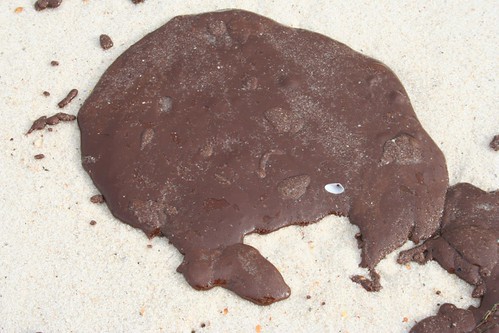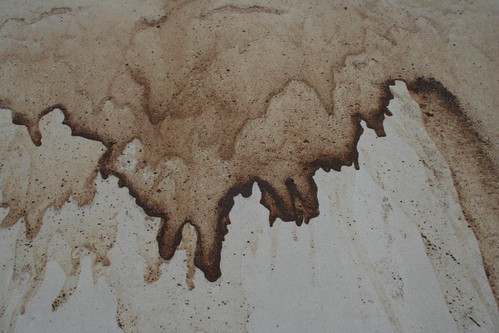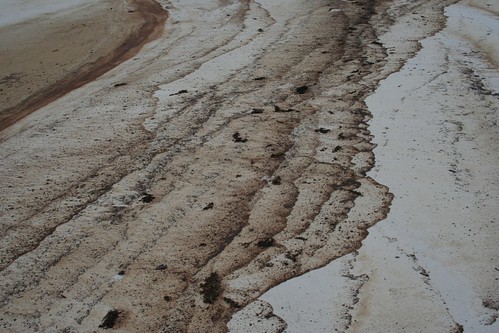 On Monday, June 28, I walked the once pristine beaches of Perdido Key, Florida and was sickened by what I saw. Until recently, these beaches were arguably the whitest sugar-sand beaches in the world. I’ve spent time in this area during nearly every year of my life and never thought I would see this day – pure, white sand covered in thick, black tar balls.
On Monday, June 28, I walked the once pristine beaches of Perdido Key, Florida and was sickened by what I saw. Until recently, these beaches were arguably the whitest sugar-sand beaches in the world. I’ve spent time in this area during nearly every year of my life and never thought I would see this day – pure, white sand covered in thick, black tar balls.
In every direction, tar balls of various sizes lay washed ashore. In front of my family’s place, just a half-mile from the Florida-Alabama state line, black lines of oil and tar ball stains cover the once white beaches.
 At Johnson Beach on Gulf Islands National Seashore at the east end of Perdido Key, the tar balls are even larger. Stains on the sand show that oil has washed over an area marked off to protect where sea turtles have laid eggs.
At Johnson Beach on Gulf Islands National Seashore at the east end of Perdido Key, the tar balls are even larger. Stains on the sand show that oil has washed over an area marked off to protect where sea turtles have laid eggs.
The tar balls are so thick in some places that I could not walk along the beach without stepping in the gooey, toxic mess. Out of place, the balls floated in the water as they washed back and forth in the surf.
 Walking along the shore, I became both sad and angry at the thought of whether my sons would ever get to see this beach clean and white again, or if they will always walk in the sand worried about the tar on their feet. Never as a boy had I once worried about stepping into tar on a beach.
Walking along the shore, I became both sad and angry at the thought of whether my sons would ever get to see this beach clean and white again, or if they will always walk in the sand worried about the tar on their feet. Never as a boy had I once worried about stepping into tar on a beach.
I shot a video of my disheartening walk on these beaches, desperate to get the word out about the devastation that I encountered.

It is enraging that states in the western Gulf – Alabama, Mississippi, Texas and especially Louisiana – have sold out to the oil industry. These states have now put the entire Gulf of Mexico and every single one of its beaches, fisheries and people at risk to make a fast buck. We as a nation do not have to sacrifice our natural beauty to feed our addiction to oil. Less than 10 percent of the oil we consume comes from the drilling in the Gulf.
 Twenty minutes west are Orange Beach and Gulf Shores, Alabama. In May, after flying over the Deepwater rig site, I walked these areas knowing that the oil was a mere 20 miles offshore – only one month later, it is on the beach. Signs along boardwalks advised against swimming in the water, and the beach was covered in tar balls.
Twenty minutes west are Orange Beach and Gulf Shores, Alabama. In May, after flying over the Deepwater rig site, I walked these areas knowing that the oil was a mere 20 miles offshore – only one month later, it is on the beach. Signs along boardwalks advised against swimming in the water, and the beach was covered in tar balls.
On the west side of Gulf Shores, the air smelled of acrid petroleum. It is infuriating that what would normally smell of the humid, salty air of the Gulf now smelled like a chemical industrial park.
 Walking along the dunes, I was shocked to see thick oil lines all along the beach. Here, oil was actively washing ashore and I watched as it churned in the surf. What used to be warm Gulf waters, inviting to swim in or walk barefoot through, was now a foul-looking toxic stew that caused me to recoil in disgust.
Walking along the dunes, I was shocked to see thick oil lines all along the beach. Here, oil was actively washing ashore and I watched as it churned in the surf. What used to be warm Gulf waters, inviting to swim in or walk barefoot through, was now a foul-looking toxic stew that caused me to recoil in disgust.

Hundreds of people are working hard to clean up this devastating mess, and businesses in these areas are still trying to get people to visit the beaches to keep money coming into their now struggling communities. But these are not the beaches I grew up on. It is devastating to know that no amount of optimistic tourist-luring spin is going to clean the oil from these shores.
From my flight over the coast, I saw first hand the amounts of oil in the Gulf that will eventually come ashore. Coast Guard ships just offshore were marking the heavy oil in the tide lines as it drifted closer to the beaches.

As I walked along the oil-covered beach, I grew more enraged at the people who sued to lift the deep-water drilling moratorium, even as oil continues to spew into the Gulf. I am angered by the greed of BP executives who cut corners on safety, unleashing this disaster. But most of all, I worry if we as a people will wake up for this devastating environmental catastrophe and change our ways. Will we learn from this and make changes in our governmental policies to require increased efficiency in our vehicles, support cleaner fuels, electrification of our cars, and put a price on carbon pollution to set in place the market forces that will move us away from fossil fuels? Will people change their personal practices and begin buying cleaner, more fuel-efficient cars, or begin driving less all together? Will they demand their elected officials to play fewer political games and get more done? My fear is that we will grow numb to the miles of oily stains and tar balls on our once pristine beaches. I pray for our planet and future generations that we don’t let this happen.
To see the entire set of photos, visit our Flickr page.